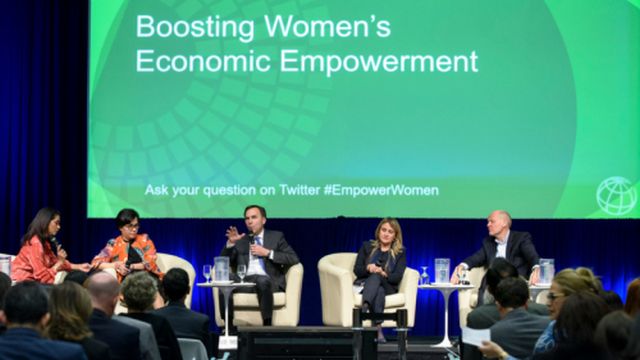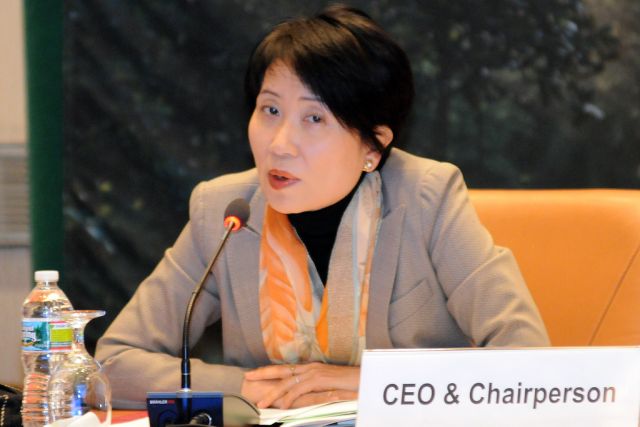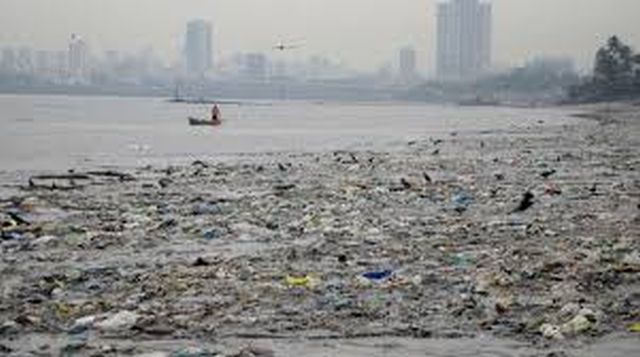
by admin | May 25, 2021 | Interviews, World
 By Vishal Gulati,
By Vishal Gulati,
Da Nang (Vietnam) : Women everywhere still face everyday disadvantages. Empowering them will unlock new potential to tackle environmental challenges, President of the Marshall Islands, Hilda C. Heine, has said.
“The GEF (Global Environment Facility) has long emphasised on gender – still, every woman, especially in our Pacific nations, needs to walk the talk and make sure that they enjoy the same economic rights as men,” Heine, the first woman to lead an independent Pacific Island nation, told IANS in an interview.
Heine, who was elected President of the Marshall Islands in January 2016, was in this Vietnamese tourist resort city to address the GEF Assembly, the organisation’s highest governing body.
The assembly saw attendance of 1,200 delegates, including ministers and other representatives, from all its 183 member-countries, with bold commitments for action to avoid an environmental catastrophe.
“We have to keep working for gender-responsive government policies and programmes; decision-making and leadership; economic empowerment; ending violence against women, and ensuring effective education and sexual reproductive health services,” Heine contended.
She advocated that building capacity on gender equality also helps catalyse actions that have the potential to materialise greater environmental impact.
For Heine, the low-lying nations like hers are still grappling with an existential threat in the face of the growing global environmental crisis.
According to her, the GEF, the world’s foremost institution for financing environmental change, has given a billion dollars in grants to safeguard the environment.
“The work of GEF supporting developing countries with nationally-led emission reduction efforts and protection for millions of people vulnerable to climate change has saved lives and improved our chances for survival. Still we need a political momentum in tackling climate challenges,” a confident Heine said.
Around 50 heads of government will hold the world’s first-ever virtual summit on November 22 that Heine announced at the GEF Assembly.
The carbon-free summit will bring together leaders of the 48-nation Climate Vulnerable Forum (CVF), which represents many of the countries most threatened by climate change.
Heine, who will soon assume the chairmanship of the CVF, announced that the summit would be convened entirely online as a “Virtual Summit”, showcasing intentions to work in new and innovative ways and to build broader coalitions.
The summit was immediately acknowledged by global leaders like French President Emmanuel Macron and California Governor Edmund G. Brown Jr. Heine said it is a crucial step for helping to renew political momentum and awareness to enable the vulnerable to survive and thrive.
“Our summit will be showcasing our intensions to work in new and innovative ways and to build broader coalitions across society for the change we need.
“Small countries like mine are showing leadership through ambitious mitigation targets, we want every country to step up the ambition of their own NDCs (nationally determined contributions) if we are to stay within the 1.5 degrees Celsius temperature limit we set in Paris (in 2015),” she said.
“We are working hard to match our international engagements at the national level. Under our 2025 climate target, we have committed to a 32 percent reduction in emissions compared to 2010 levels, and we have already committed to bringing forward new and more ambitious target for 2030.”
The former Education Minister, whose country played a crucial role at the 2015 Paris climate summit, is confident that optimising tapping of renewable energy sources could help overcoming climate change mitigations.
Heine said GEF’s work supporting developing countries with nationally-led emission reduction efforts and protection for millions of people vulnerable to climate change has saved lives and improved chances for survival.
She praised GEF’s contribution to addressing chemicals and pollutants played a pivotal role in paving the way for a recovery of the ozone layer.
Describing the CVF summit as an important opportunity to accelerate action towards a low carbon future, GEF CEO and Chairperson Naoko Ishii said: “At this critical time, we all need to raise our climate ambitions and the GEF is committed to transformational change.”
“In its new four-year investment strategy, GEF puts a strong emphasis on financing for Least Developed Countries and Small Island Developing States,” she added.
The Sixth GEF Assembly, held once in four years, took place from June 27 to 28 here. It also saw the presence of President David Granger of Guyana and Prime Minister Nguyen Xuan Phu of Vietnam.
(Vishal Gulati was in Da Nang for the Internews’ Earth Journalism Network Biodiversity Fellowship Programme at the Sixth Global Environment Facility (GEF) Assembly. He can be reached at vishal.g@ians.in )
—IANS

by admin | May 25, 2021 | Investing, World
 By Vishal Gulati,
By Vishal Gulati,
Da Nang (Vietnam) : In a major commitment to advance climate action in developing countries, Canada has pledged $228.79 million towards the new investment cycle of the Global Environment Facility (GEF).
Minister of International Development Marie-Claude Bibeau announced Canada’s pledge for the fiscal 2018-2019 through 2022-2023 to the seventh replenishment of the GEF.
A strong supporter of the GEF and also its sixth-largest donor, Canada reiterated its climate pledge at the Sixth GEF Assembly here in Vietnam, the GEF secretariat said on Thursday.
Developing countries constantly face the destabilising effects of climate change, with women and children facing disproportionate challenges, the Canadian government said in a statement.
Collaboration and partnerships between governments, global institutions, non-governmental and local organisations, as well as the private sector are key to moving forward on climate action.
Canada is committed to these efforts to empower the most at-risk communities to better adapt and mitigate the harmful impacts of a changing climate, it said.
Canada, through the GEF, works with partners to tackle global environmental issues and to support sustainable development, including poverty reduction and gender equality.
The GEF is the single-largest source of funding and a catalyst for action on the environment.
It funds programmes that have brought sustainable land management, benefiting smallholder farmers; provides biodiversity protection and planning for productive terrains and water bodies; and have protected river and lake basins, groundwater basins and large marine ecosystems.
GEF CEO and Chairperson Naoko Ishii told the opening session of its two-day GEF Assembly on Wednesday that humans must transform their key economic systems and move to a circular economy to restore the ecosystems.
“Every day we are receiving wake-up calls from nature; massive loss of forests and lands, species being lost, pollution of air and water. And we are suffering from increasingly visible impacts of climate, coastal cities such as Da Nang are vulnerable, and so are small islands states.”
The GEF was created in 1991 ago to help fight against these threats, she added.
Its assembly is the governing body of the GEF, a mechanism to provide grants for environment projects, and is composed of all 183 member countries.
Since the GEF was established, the initiatives it funded have reduced greenhouse gas emissions by 2,700 megatonnes and introduced more than 50 climate-friendly technologies, leading to energy efficiency, renewable energy generation and sustainable urban transport.
The GEF Assembly met two months after governments, in a demonstration of confidence, approved a $4.1 billion replenishment of its new four-year investment cycle, known as GEF-7.
(Vishal Gulati is in Da Nang for the Internews’ Earth Journalism Network Biodiversity Fellowship Programme at the Sixth Global Environment Facility (GEF) Assembly. He can be reached at vishal.g@ians.in)
—IANS

by admin | May 25, 2021 | Economy, News, World

Global Environment Facility (GEF) CEO and Chairperson Naoko Ishii
By Vishal Gulati,
Da Nang : Humans must transform their key economic systems and move to a circular economy to restore the ecosystems. The transformation is needed and is possible, a top environmentalist has said.
Global Environment Facility (GEF) CEO and Chairperson Naoko Ishii told the opening session of its two-day assembly, sixth in series, that saw over 1,000 delegates across the globe in this Vietnamese port city on Wednesday that this was “a critical moment for the future of our planet and its people”.
The opening session also saw the presence of Vietnamese Prime Minister Nguyen Xuan Phuc along with delegates from across the globe, including India, top heads of UN agencies and multilateral financial institutions, scientists and business leaders.
Heads of island nations vulnerable to rising sea levels caused by melting ice, like the Marshall Islands President Hilda Heine and Guyana President David Granger also attended.
“For the past half century, we humans have made lots of progress in our societies. But we are putting huge pressure on the health of our planet,” Ishii said.
“Every day we are receiving wake-up calls from nature; massive loss of forests and lands, species being lost, pollution of air and water. And we are suffering from increasingly visible impacts of climate, coastal cities such as Da Nang are vulnerable, and so are small islands states.”
The GEF was created more than 25 years ago to help fight against these threats, she said.
Its assembly is the governing body of the GEF, a mechanism to provide grants for environment projects, and is composed of all 183 member countries.
Going down memory lane, Ishii said she remembered the days she spent in this port city 20 years ago.
“I was here in Da Nang 20 years ago, working on a World Bank urban project, focusing on second tier cities. I remember we were walking around the streets and asking people about their desire for safe drinking water. Well, 20 years have passed, and Da Nang is not a second tier city anymore. It is a major city with modern infrastructure and international links.”
Sounding an alarming note, the GEF chief said: “We continue to push the carrying capacity of our planet to its breaking point. Business as usual will guarantee disaster.”
“Scientists tell us that we have entered into the aanthropocene’ where humans are the dominant force changing the function of earth. So we, humans, must change.”
“We must transform our key economic systems; our food and land use system, our cities, our energy system, and move on to a circular economy. We must restore the ecosystems that are the very foundation for our societies and economies as we know them,” he said.
Still an optimistic Ishii said “there is a hope”
“Up to the 2015 Paris climate agreement, there emerged a number of like-minded collations among business, cities, governments, academia and citizens, which played key role to Paris agreement.”
“And the sustainable development goals provide a good framework to hold us together to catalyze the necessary change.”
The Vietnamese Prime Minister, in his welcome address, said integrated solutions are needed to address global threats like marine plastic and biodiversity loss to protect the planet.
The GEF Assembly is meeting two months after governments, in a demonstration of confidence, approved a $4.1 billion replenishment of its new four-year investment cycle, known as GEF-7.
(Vishal Gulati is in Da Nang for the Internews’ Earth Journalism Network Biodiversity Fellowship Programme at the Sixth Global Environment Facility (GEF) Assembly. He can be reached at vishal.g@ians.in)
—IANS

by admin | May 25, 2021 | Business, Emerging Businesses
 By Vishal Gulati,
By Vishal Gulati,
Da Nang (Vietnam) : Playing a crucial role to mitigate climate change and other environmental challenges across the globe, India on Tuesday announced it will increase for the next four years the money it pays to the Global Environment Facility (GEF), a mechanism to provide grants for environment projects.
India’s representative to GEF Council Aparna Subramani made the announcement at its meeting in this Vietnamese city that will conclude on June 28.
Subramani, who represents India in the World Bank and a representative of Bangladesh, Bhutan, Maldives, Nepal and Sri Lanka, besides her home country in the GEF Council, told the gathering that India has decided to increase its commitments from $12 million to $15 million to the GEF’s new four-year investment cycle, known as GEF-7.
GEF CEO and Chairperson Naoko Ishii, who opened the GEF council meeting on June 24, thanked India for increasing its financial support, which will go to other developing countries to deal with urgent environmental crises.
Subramani also said at the council meeting that NGOs getting money for GEF projects should not remain the same over years. This point was immediately supported by the delegate from Argentina.
The GEF Council is meeting two months after governments, in a demonstration of confidence, approved a $4.1 billion replenishment of GEF-7.
GEF, established on the eve of the 1992 Rio Earth Summit to help tackle the planet’s most pressing environmental problems, has provided $17.9 billion in grants and mobilised an additional $93.2 billion in financing for more than 4,500 projects in 170 countries.
India, among the world’s most vulnerable countries to climate change, is both a donor and a recipient of GEF, an international partnership of 183 countries.
The GEF Council will be followed be the sixth GEF Assembly (June 27-28), which meets every four years, and is expecting 1,200 participants, including heads of state, environment ministers, UN, NGO and business leaders.
(Vishal Gulati is in Da Nang for the Internews’ Earth Journalism Network Biodiversity Fellowship Programme at the Sixth Global Environment Facility (GEF) Assembly. He can be reached at vishal.g@ians.in)
—IANS




